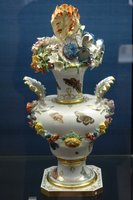Monday, September 25, 2006
Porcelain, the Enlightenment, and Wikipedia? Maybe.
Do you like this story?
Perhaps this isn't directly related to the mission of onthecusp.org, but I'll have a go at this anyway.
I’ve been interested in 18th century porcelain for a while now. You know those smallish figures and table ware, vases, urns, and the rest.  Not because they are things that I dream of having in my home, or even things that I want to see at my neighbors house, with their garish purple, green and gold colors, but I’m interested in them because the represent to me a clear sign post from the past; one that demonstrates technical innovation and ingenuity (Europeans wanted to figure out how to make them after the Chinese and Japanese had been making them for centuries – kind of like taking a bite of a cake, blindfolded, and then trying to figure out how to make it. Kind of like that, but much harder).
Not because they are things that I dream of having in my home, or even things that I want to see at my neighbors house, with their garish purple, green and gold colors, but I’m interested in them because the represent to me a clear sign post from the past; one that demonstrates technical innovation and ingenuity (Europeans wanted to figure out how to make them after the Chinese and Japanese had been making them for centuries – kind of like taking a bite of a cake, blindfolded, and then trying to figure out how to make it. Kind of like that, but much harder).
Porcelain was considered "White Gold," reputed to have healing properties if you drank from a cup made of it, not unlike the myth of a unicorn’s horn. Porcelain was a hot comedy in the 17th and 18th century, one for collecting and assembling in rooms and throughout the dinner table. They remain, to me, great technical achievements of artistry and monuments to collecting and capitalism. They were once pieces made for kings and princes but were eventually made for the middle class. Now you can get a porcelain figurine of about anything for just about nothing.
In 1771, Nicolas-Christien de Thy Comte de Milly published L'Art de la porcelaine,
which was part of a larger project in which 113 volumes were published by the Academie Royale des Sciences called the Descriptions des Arts et Métiers. These in-depth volumes described many technical craft processes and tools. Near the same time as this, Denis Diderot was working on the Encyclopédie. These books promoted logic, reason, and open thought and the exchange of information. Clearly they are important publications from the Enlightenment, a period which was presupposed some 300 years by another great technical achievement, the invention of moveable type.
So, by the early 19th century, the middle class had access to not only fine porcelain, but an encyclopedia, among other books. Here in the 21st century, being middle class (at best), I have access to the Wikipedia (and, well, yeah, I could go to the Goodwill and get the Brittanica, and maybe some porcelain, but let’s not talk about that). The Wikipedia was created (or started) by a couple guys who wanted to give people a chance to write articles about things they know, and then give people the chance to agree or disagree with what’s there; to improve on the truth; have the truth written by everyone in a purely democratic way. I’m not going to go into the whole history of Wikipedia or encyclopedias. Others have done it better. Check it out here or here.
If Andy Warhol said we would all get our own 15 minutes of fame, I think Wikepedia says we can all record our 15 minutes of history. And what more do we all want than to somehow leave an indenable mark on human history? To show that some part of what we know is worth recording and keeping; that’s important. Who knows, maybe that’s just me. Or maybe it isn’t, but Wikipedia is your chance to prove it (go write it and see if it stays, or gets bigger).
If, for me, porcelain is a kind of sign post of innovation and by default the Enlightenment, and the Encyclopédie was at the center of that, then where does that leave us now?
And what does this mean for contemporary art? What materials are described there, what techniques are derscribed there, what bits of pop culture are there (I have to add at least one thing to look up: The Smurfs!). And perhaps most importantly, who’s being recorded now in the Wikipedia, and who should be? Can you think of 5 working artists now that are in there, how about any working in Indy? And is it important for them to be there?
Who's making the entrances? Should you be?






1 Responses to “Porcelain, the Enlightenment, and Wikipedia? Maybe.”
September 27, 2006 at 10:41 PM
Strangely enough I have rarely used Wikipedia not because I don't trust it only that it has yet to really cross my mind when doing research on a subject. I too think that there is something interesting about the democratic approach to writing history that it allows but wonder at what point it falls apart. Will it or has it fallen apart? You have given me something else to think about though I may skip the Smurfs for the time being...
-Scott
Post a Comment